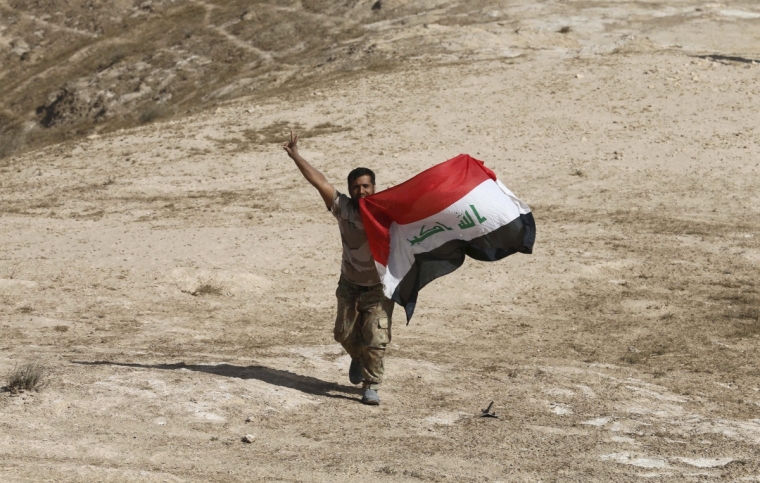Baghdad pastor talks about life in the besieged city; says global refugee crisis a 'golden opportunity for evangelism'

BAGHDAD, Iraq (Christian Examiner) – In a city where ISIS brutality has almost become commonplace and yet the persecuted and the persecutors still have great need of God's love, Farouk Hammo, pastor of a church in Baghdad, tries to encourage his flock in the face of terrorism.
"War, unfortunately, has become normal to the people of Baghdad," Hammo told Open Doors in an interview. "We experience a bomb attack, bury the bodies and continue. It's not that it doesn't affect us, but all these years of war have created a hard skin."
If your identity is strong, people will come to faith in Christ through you. We need to stand together in Christ and pray together. That's how we can change the world.
Because of the nearness of war, most members of Hammo's church, who try to live normal lives by going to work, going to church, and spending time with family members, have stories of loss.
"No one in our church has died due to the war in the past five years, but everyone has his or her story. Many of us have experienced loss ... loss of family members or loss of earthly possessions," he said.
Hammo is concerned for the emotional state of his church members. "We experience discrimination and a lack of peace. People feel rejection, resentment and bitterness.
The "hard skin" Baghdadi Christians have grown is no surprise considering the extreme trials Iraqi Christians have faced at the hands of ISIS.
PERSECUTED CHRISTIANS IN IRAQ
According to a 2014 report about civilians in Iraq, published by the United Nations Assistance Mission for Iraq (UNAMI) and the Office of the United Nations High Commissioner for Human Rights (OHCHR), ISIS specifically targets Christians and other religious and ethnic minorities.
"Of particular concern is the expulsion of Christians from Mosul and occupation of their houses and seizure of all their belongings, including personal and indispensable food items," the report said.
Not long after ISIS, called ISIL in the report, took possession of Mosul, a city in northern Iraq, it "was largely empty of Christians except for a small number who were too poor or otherwise not able to leave." ISIS threatened, robbed, and beat Christians as they fled.
"Many reported having their possessions stripped from them or that they were physically or sexually assaulted by ISIL fighters at checkpoints as they were fleeing the city," the report continued. "[A]round 45 abandoned Christian institutions were demolished, converted to mosques or used as bases by ISIL."
Pastor Hammo calls the reality of ISIS and the need of refugees a "wake-up call."
"As Christians, we need to stand firmly in our identity. Millions have lost everything, but some have found Christ."
He believes the church should "practice Christianity" by ministering to the internally displaced people (IDP) within reach. "It doesn't matter if they are a Christians like us our not. God asked us to be gracious to all."
When Christians are kidnapped or killed for their faith, God must remain the center of a Christian's trust.
"God is in everything for us," Hammo said. "He leads us and sends the right people our way. He gives us peace and happiness, despite the situation."
A WAKE-UP CALL FOR THE CHURCH
The OHCHR report relates one terrifying incident from Aug. 2014 while Christians were trying to escape the advance of ISIS in northern Iraq. According to the report, 32 Christians were seized and detained by ISIS.
"ISIL seized their belongings and took six of them to another room. After about half an hour, the remaining 26 were forced to board a minibus to take them to Khazir Bridge in eastern Hamdaniya District. Before the minibus was about to leave, an ISIL fighter seized a three-year old girl; when the mother, who was on the minibus, begged them to return her daughter to her, ISIL threatened to kill her and her entire family if she did not get back on the bus. The woman was forced to leave her daughter behind."
The Christians on the bus were taken to the nearby city of Erbil. "It was reported that the seven abducted Christians were taken to Mosul, but their fate remains unknown."
Horror stories like these could easily erode the faith of a church not built on a solid foundation. "If your identity is strong, people will come to faith in Christ through you," Hammo testified. "We need to stand together in Christ and pray together. That's how we can change the world."
Despite the uncertainty, fear and loss, Hammo challenges Christians around the world to active outreach. "I would like to say to you all: please wake up. In Europe, a lot of Muslims are entering now as refugees. This is a golden opportunity for evangelism."